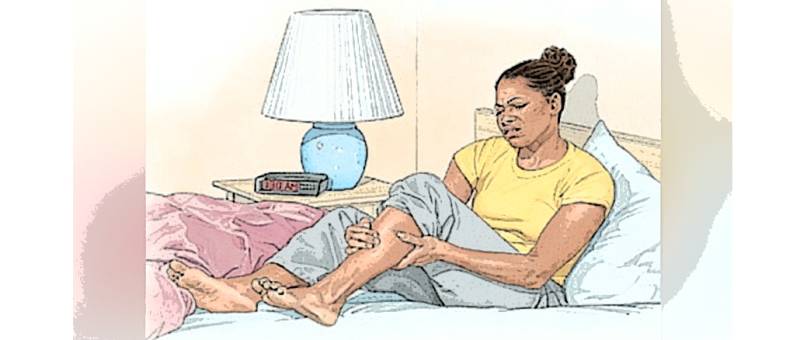How To Fix Leg Cramping At Night

Leg cramping can be very painful and a real nightmare, especially when it wakes you at night. Nocturnal leg cramps are sudden, involuntary contractions of the calf muscles during the night or periods of rest.
The duration of these cramps can be anywhere from a few seconds to several minutes. Although the intense pain may go away, muscle soreness may remain for some time.
Here are some of the causes for leg cramping:
1. Dehydration
Proper hydration enables a healthy body and mind. It also impacts the performance of your muscles.
Water comprises 75 percent of muscle tissue and helps them contract and relax easily. So, not maintaining proper levels of hydration during the day may be one of the big causes of leg cramps at night.
Water is vital for proper circulation of nutrients in the body. Without water, muscles will be deprived of important nutrients, which can lead to imbalances of electrolytes (mainly sodium, potassium, calcium and magnesium).
In fact, even small amounts of dehydration may hinder athletic performance and increase the chance of cramps at night.
2. Nutritional Deficiency
Any kind of imbalance of mineral electrolytes—sodium, potassium, calcium and magnesium—in the body can contribute to nocturnal and exercise-associated cramps. These minerals are responsible for both nerve impulses and muscle contractions, and keep your muscles working smoothly.
Sodium, one of the main positively charged mineral ions or electrolytes in body fluid, helps maintain a normal body-fluid balance and is critical for nerve impulse generation and muscle contraction.
Potassium is an important electrolyte found in all body cells, including muscle and nerve cells. It works along with sodium and chloride to generate electrical impulses in the nerves and the muscles. Calcium is involved in muscle contractions as well as the generation of nerve impulses. Magnesium aids in stabilising adenosine triphosphate (ATP), the energy source for muscle contractions, and also serves as an electrolyte in body fluids.
Deficiency of any of these minerals can lead to cramps and other muscle-related problems.
Additionally, certain B vitamins impact muscle function, particularly vitamin B12.
3. Overexertion or Prolonged Standing
Standing on a hard surface for a long time as well as standing while wearing high heels or poorly fitting shoes can contribute to muscle fatigue or overexertion. This in turn can cause leg cramps at night.
A 2012 study published in Ergonomics showed that prolonged standing at work may be an important risk factor for varicose veins and nocturnal leg cramps among both men and women.
The study even suggests that interventions to interrupt or reduce prolonged standing at work should be implemented to prevent these problems.
Also, sitting improperly or putting your legs in awkward and uncomfortable positions when sleeping can contribute to nocturnal leg cramps.
Tips to fix and prevent leg cramping at night:
- Drink plenty of water and other healthy fluids to prevent dehydration.
- Drinking sports drinks with electrolytes can be useful in preventing the problem.
- Steer clear of alcohol, coffee and soda beverages that rob the body of water, increasing the risk for cramping.
- Stretch your leg muscles before going to bed. Stretching your calves can help ease muscle tension and reduce the chance of having a cramp at night. A 2012 study published in the Journal of Physiotherapy reports that stretching before sleep reduces the frequency and severity of nocturnal leg cramps in older adults.
- Riding a stationary bicycle for 10 minutes before you go to bed is another good option.
- Keep blankets and bed sheets loose around your feet so that your toes are not distorted.
- If you have a cramp, massage the cramped muscle with your hands for 10 to 15 minutes.
- Walking or jiggling the leg after a cramp will send a signal to your brain that your muscle needs to contract and then relax. This can promote faster recovery.
- Applying a hot compress to the cramped muscle can relax and loosen it up, thus easing the cramp.
- Make sure to get enough potassium in your diet. Good sources of potassium include bananas, dates, apricots, grapes, cabbage, broccoli, oranges, grapefruit, fish, pork and lamb.
- Also, try adding more magnesium to your diet. Nuts and seeds are excellent sources of magnesium.
- Pregnant women should consult a doctor about taking magnesium supplements.
Did you find this helpful? Leave your feedback in the comments below.
- Tags: beauty, health, leg cramping, night, sleep
